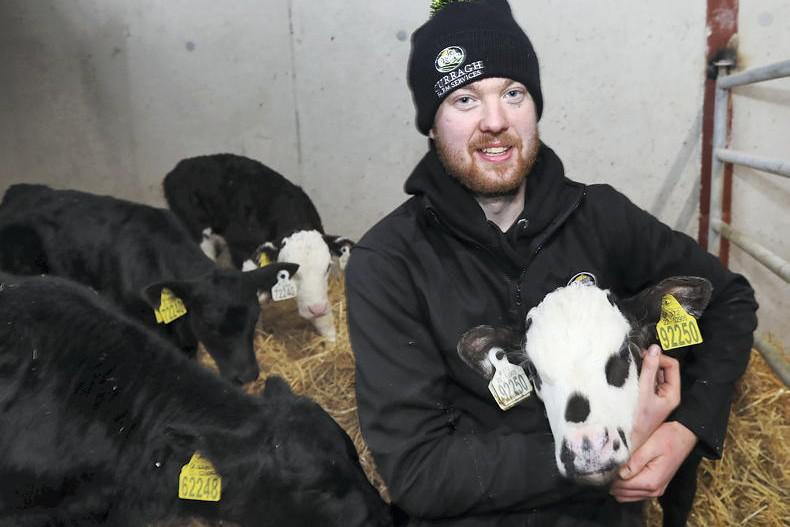Glanbia Ireland is introducing a new payment system in NI that will place greater value on butterfat and protein, which will ultimately encourage its suppliers to produce higher quality milk.
The new payments start on 1 April 2021, with the changes phased in over the next four years to give suppliers time to adjust breeding programmes and herd management.
Butterfat
In year one, which runs from April 2021 to March 2022, butterfat will increase to a base of 3.85%.
In years two, three and four, base levels for butterfat will rise to 3.87%, to 3.88% and 3.9% respectively.
Payment for butterfat will rise to 0.021p/l for every 0.01% increment above, or below, base level in year one.
In year two, butterfat is worth 0.024p/l rising to 0.027p/ and 0.03p/l in years three and four.
Protein
Protein will move from a base of 3.2% in year one, to 3.22%, 3.23% and 3.25% over the next three years.
Payment on protein is set at 0.037p/l for every 0.01% increment above or below base in year one, rising to 0.043p/l in year two, 0.049p/l and 0.054p/l in years three and four.
Current system
The outlined change is a significant departure from Glanbia’s current payment model in NI, which operates on a base of 3.8% to 3.84% for butterfat.
While bonus payments are made for every 0.05% increase, butterfat is effectively worth 0.018p/l for every 0.01% change.
For protein, base is currently 3.15% to 3.19% with a payment of 0.032p/l per 0.01% increase above base.
Transport
Glanbia is also dropping transport charges for milk collected on alternate days, saving suppliers £8 per collection.
Daily collections will still incur a cost, but rather than a charge of £8, the maximum will be £6 per lift.
To enable suppliers to benefit from the new collection charging regime Glanbia is providing suppliers with financial support for upgrading bulk tank storage at a rate of 0.2p/l over four years. The new tank must be capable of holding five milkings at peak.
Volume
The other significant change is a new volume bonus paid to suppliers from 1 April. Those supplying between 500,000 and 1m litres annually will receive 0.25p/l, with suppliers of 1m litres and above receiving 0.5p/l.
What is the new payment worth?
If we take a farmer supplying 1m litres per annum at 3.3% protein and 4.06% butterfat, (in line with the NI average), and using Glanbia’s monthly base price for 2020, annual milk sales are worth £274,020 under the current payment system.
Assuming base price remains constant, in year one of the new payment regime, when we account for changes in collection charges and the new volume bonus, total milk sales increase to £281,110.
But by year four, because milk solids have not increased (and the gap to the base has narrowed), annual milk sales are down slightly to £280,500.
However, if the supplier is able to lift butterfat and protein to 4.20% and 3.35% by year four, annual milk sales would rise to £287,400.
For a farmer already with high solids (eg 4.30% fat; 3.35% protein) they are better off under the new regime in year one, and because of the increased value put on fat and protein each year, their income continues to rise.
Reaction
It is understood there was a large majority of Glanbia suppliers in favour of moving to payments that rewards higher milk solids, although some suppliers who are mainly focused on yield fear being worse off.
Glanbia also indicates there has been strong interest from farmers about the possibility of switching from other processors.
However, with no spare processing capacity, this is not a reality at present.
UFU welcomes
Glanbia move
The new payment regime announced by Glanbia Ireland has been welcomed by the UFU.
Describing it as a “significant breakthrough”, UFU deputy President David Brown said that the farm lobby organisation has been investigating constituent pricing of milk for some time.
“The move by Glanbia Ireland comes at a crucial time for our dairy sector. It could boost the competitiveness of our sector as we utilise new trade opportunities and face new challenges in this post-Brexit era,” said Brown.
Read more
IFA presses for answers on Aldi’s labelling of Irish milk
Glanbia introduces peak milk penalty for farmers
Glanbia Ireland is introducing a new payment system in NI that will place greater value on butterfat and protein, which will ultimately encourage its suppliers to produce higher quality milk.
The new payments start on 1 April 2021, with the changes phased in over the next four years to give suppliers time to adjust breeding programmes and herd management.
Butterfat
In year one, which runs from April 2021 to March 2022, butterfat will increase to a base of 3.85%.
In years two, three and four, base levels for butterfat will rise to 3.87%, to 3.88% and 3.9% respectively.
Payment for butterfat will rise to 0.021p/l for every 0.01% increment above, or below, base level in year one.
In year two, butterfat is worth 0.024p/l rising to 0.027p/ and 0.03p/l in years three and four.
Protein
Protein will move from a base of 3.2% in year one, to 3.22%, 3.23% and 3.25% over the next three years.
Payment on protein is set at 0.037p/l for every 0.01% increment above or below base in year one, rising to 0.043p/l in year two, 0.049p/l and 0.054p/l in years three and four.
Current system
The outlined change is a significant departure from Glanbia’s current payment model in NI, which operates on a base of 3.8% to 3.84% for butterfat.
While bonus payments are made for every 0.05% increase, butterfat is effectively worth 0.018p/l for every 0.01% change.
For protein, base is currently 3.15% to 3.19% with a payment of 0.032p/l per 0.01% increase above base.
Transport
Glanbia is also dropping transport charges for milk collected on alternate days, saving suppliers £8 per collection.
Daily collections will still incur a cost, but rather than a charge of £8, the maximum will be £6 per lift.
To enable suppliers to benefit from the new collection charging regime Glanbia is providing suppliers with financial support for upgrading bulk tank storage at a rate of 0.2p/l over four years. The new tank must be capable of holding five milkings at peak.
Volume
The other significant change is a new volume bonus paid to suppliers from 1 April. Those supplying between 500,000 and 1m litres annually will receive 0.25p/l, with suppliers of 1m litres and above receiving 0.5p/l.
What is the new payment worth?
If we take a farmer supplying 1m litres per annum at 3.3% protein and 4.06% butterfat, (in line with the NI average), and using Glanbia’s monthly base price for 2020, annual milk sales are worth £274,020 under the current payment system.
Assuming base price remains constant, in year one of the new payment regime, when we account for changes in collection charges and the new volume bonus, total milk sales increase to £281,110.
But by year four, because milk solids have not increased (and the gap to the base has narrowed), annual milk sales are down slightly to £280,500.
However, if the supplier is able to lift butterfat and protein to 4.20% and 3.35% by year four, annual milk sales would rise to £287,400.
For a farmer already with high solids (eg 4.30% fat; 3.35% protein) they are better off under the new regime in year one, and because of the increased value put on fat and protein each year, their income continues to rise.
Reaction
It is understood there was a large majority of Glanbia suppliers in favour of moving to payments that rewards higher milk solids, although some suppliers who are mainly focused on yield fear being worse off.
Glanbia also indicates there has been strong interest from farmers about the possibility of switching from other processors.
However, with no spare processing capacity, this is not a reality at present.
UFU welcomes
Glanbia move
The new payment regime announced by Glanbia Ireland has been welcomed by the UFU.
Describing it as a “significant breakthrough”, UFU deputy President David Brown said that the farm lobby organisation has been investigating constituent pricing of milk for some time.
“The move by Glanbia Ireland comes at a crucial time for our dairy sector. It could boost the competitiveness of our sector as we utilise new trade opportunities and face new challenges in this post-Brexit era,” said Brown.
Read more
IFA presses for answers on Aldi’s labelling of Irish milk
Glanbia introduces peak milk penalty for farmers









SHARING OPTIONS